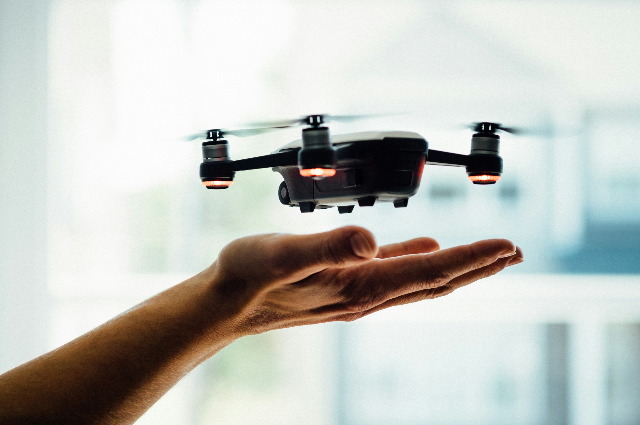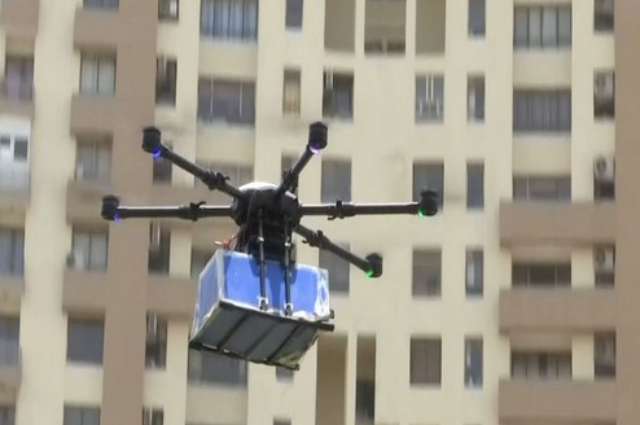
In a significant advancement for urban logistics, Gurugram has introduced drone deliveries for groceries alongside medicines. This initiative aims to tackle the persistent challenges of traffic congestion and environmental pollution. According to Ankit Kumar who is the CEO of Skye Air, this innovative approach is already making waves in the city.
Advantages of Drone Deliveries
- Speed and Efficiency: Drones offer a rapid delivery service that outpaces traditional methods. In congested cities like Gurugram, drones navigate over traffic jams by ensuring that deliveries reach customers much faster. For instance, Praveen Dutt Purohit who is a local resident shared his experience of receiving online orders in record time. He was astonished to learn from the delivery personnel that the secret to this swift service was drone technology.
- Eco-Friendly Solution: Apart from speed, drone deliveries present a greener alternative. By reducing the reliance on-road vehicles, drones help lower emissions and contribute to a cleaner environment. This dual benefit of speed and sustainability makes drones an attractive solution for urban deliveries.
The Role of Skye Air
- Company Background: Skye Air, a pioneer in drone logistics, was established in 2019. Under the leadership of CEO Ankit Kumar, the company has made significant strides in the field of drone deliveries. Kumar highlighted that Gurugram stands out as the first city where drone delivery has been successfully implemented on a large scale.
- Government Support: The success of drone deliveries in Gurugram is not just a private-sector achievement. The local government has played a crucial role by providing support and facilitating the growth of this sector. This collaboration between Skye Air and the government emphasizes the potential of public-private partnerships in driving technological innovation.
Gurugram’s adoption of drone delivery services marks a milestone in urban logistics. By addressing traffic and environmental challenges, drones are setting a new standard for quick and eco-friendly deliveries. With the backing of both the private sector and the government, this initiative in Gurugram could pave the way for broader implementation across other cities.
The Rise of Skye Air: A Game Changer in Urban Delivery
- Expansion from Humble Beginnings: Kumar from Skye Air shared insights into the company’s growth trajectory, stating, "We began with just two drones, and now we operate a fleet of 30." This remarkable growth highlights the significant advantages that drones offer over traditional delivery methods, particularly in busy urban environments like Gurugram.
- Accessibility and Reach: Navigating Difficult Terrain: Drones excel in reaching areas that are typically hard to access. Kumar pointed out that drones can easily travel through narrow streets and densely populated zones, thereby broadening the scope and efficiency of delivery services. This expanded reach is especially beneficial in areas where traditional delivery vehicles struggle to operate.
Applications in Healthcare: Delivering Medical Supplies
Ankit from Skye Air discussed the vital role drones play in healthcare, particularly in delivering medicines to remote and mountainous regions. These areas often pose significant challenges for conventional delivery methods. The ability of drones to deliver essential medical supplies to such hard-to-reach places emphasises their importance and utility in critical situations.
The evolution of Skye Air from a modest start to a leading player in the drone delivery sector illustrates the transformative impact of this technology. By offering faster, more efficient, and environmentally friendly delivery solutions, drones are set to revolutionize logistics, especially in urban and hard-to-reach areas. As the technology continues to advance, its applications in sectors like healthcare further highlight its potential to make a meaningful difference in people's lives.
The Promise and Challenges of Drone Delivery in Himachal
- Expanding Drone Fleet: Ankit Kumar highlighted the significant strides being made by their company in Himachal Pradesh, where road blockages are a common issue. He emphasized their notable contributions to the healthcare sector, stating, "We are doing good work in the healthcare sector." Kumar revealed ambitious plans for the future by aiming to expand their drone fleet to 100 units within the next 18-24 months.
- Weather-Related Challenges: Impact of Weather on Drone Operations Discussing the obstacles faced by drone delivery, Kumar pointed out the significant challenge posed by adverse weather conditions. He noted, "Everything that flies in the sky has to face the weather." This highlights the vulnerability of drone operations to environmental factors which can disrupt delivery schedules and impact reliability.
Operational Limitations

When asked about the feasibility of drone deliveries during bad weather, Kumar admitted, "When the weather is very bad, we do not fly the drone." He explained that while drones can operate in light rain, they avoid flying in severe weather conditions to ensure safety. This cautious approach emphasises the need to balance operational efficiency with safety concerns.
The progress in drone delivery, particularly in challenging terrains like Himachal Pradesh, showcases the potential of this technology to overcome traditional logistical hurdles. However, the impact of weather on drone operations remains a significant challenge. By acknowledging these limitations and planning for a substantial increase in its drone fleet, Ankit Kumar's company is self-assured to enhance their service capabilities while maintaining a focus on safety and reliability.
Tackling the Last-Mile Delivery Challenge in Developing Countries
- Persistent Obstacles: One of the most pressing issues in many developing countries is the difficulty of last-mile delivery. Medical supplies meant for remote areas often face significant hurdles that can delay or prevent their arrival. These supplies might get damaged, stranded or even lost during transit, severely impacting healthcare services in these regions.
- Potential of Drones: Drones offer a promising solution to these delivery challenges. They can transport essential goods to vulnerable populations by bypassing traditional access barriers, ensuring quicker delivery of lifesaving medicines. However, a major hurdle is building public trust and complying with regulations to safely integrate drones into healthcare systems.
Geographic Challenges
Countries with diverse terrains, like India, face additional complexities. India has around 30,000 government-run primary healthcare centres catering to its 1.4 billion people. Of these, 5-10% are almost inaccessible due to their remote locations or susceptibility to natural disasters. This geographical diversity limits the effectiveness of traditional delivery methods and highlights the need for innovative solutions like drone delivery.
Regulatory Adaptations
Navigating the regulatory landscape has been a significant journey. The 2021 drone regulations opened new possibilities for drone operations, but these changes came after extensive consultations between the public and private sectors and numerous policy revisions. This regulatory evolution is crucial for the widespread adoption of drone-based delivery systems by highlighting the need for continuous improvement in policies to support this innovative approach to healthcare logistics.
Addressing last-mile delivery challenges in developing countries is essential for improving healthcare access. Drones represent a transformative solution, capable of overcoming geographical and logistical barriers. However, achieving this requires building public trust, ensuring safety and navigating complex regulatory environments. With thoughtful implementation, drones can revolutionise the delivery of medical supplies, reaching even the most inaccessible regions efficiently and reliably.
. . .
References:
